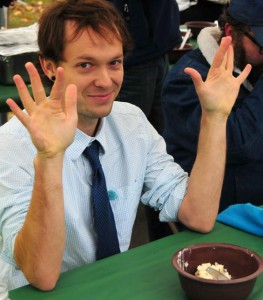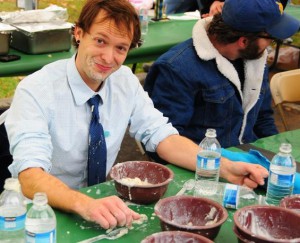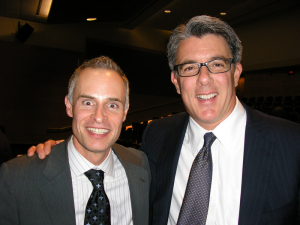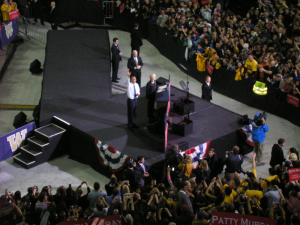Pradeep and I were supposed to go to Humsafar and a museum after that but it was in the afternoon and kind of hot and his house was nearby so he suggested we stop for a half hour and then go. As it turned out I was interested in talking with his family and I just stayed the evening there.
His father Lagaadeji’s manner of speech seemed to me like that of a Dickensian gentlemen. He was a government employee for the railway for 33 years, now retired and working as an inspector for local schools. As he explained things, there are about 100 government-employed teachers in his area for kids below college level. He drops in unnannounced and sits in on their classes, then grades them. If there is a problem then he refers them to a committee. He told me some things about Maharastran history and on hearing my name he referred me to an American author named James Lane who wrote a biography on Shivaji. After building rapport he told me about his family.
In the way that Indians trained in British oration do, he told me he had three sons. He told that his eldest, Anand, was married, worked at some place, had a child, and that he lived at home and that I could meet him later. He told me that his second, whose name I forgot because I did not meet him, was married, worked at some place, had a child, and that he lived some distance from Mumbai. Then he said his third son, Pradeep, is married, works at clinics as you know, has a child, and is currently homeless. He told me that his child is 100 times more beautiful than Pradeep and said something to indicate that there is family tension. As I listened to him I got the impression that he knew quite well that Pradeep was with me and I with him because we intended to suck dick together. He then segued into telling me that he had a daughter, and that she was married and had two children, and that I should go meet them.
Pradeep took me to his sister’s home and on the walk there he apologized for not telling me that he was married and that he had a child. He she was in good spirits. She invited me to stay at her place that night as Pradeep had also been staying there. In the course of the evening she introduced me to her son who works in a call center and her daughter who is in school, and she introduced me to her husband. We talked for a while and they asked me how the Gay Pride rally was and what it was like to be gay in America. I enjoyed their company. They then said that we should go meet Pradeep’s wife, child, and in-laws.
On the walk over there Pradeep told me that he had not seen his wife for a couple of months. I asked him if he was sure he wanted to meet her now and he said yes, but only for a few minutes. We ended up staying there for about an hour. Everyone was very friendly to me. Upon arriving they had me hold his child, which felt very weird to me. They told me everyone’s name and what they did. I was sitting in a chair and I thought I was near a wall but at some point I looked back and realized that the wall was some distance behind me and I felt disoriented. Also I suddenly noticed that there was a rabbit on a shelf at my eye level. I looked at the rabbit and Pradeep’s mother-in-law noticed my interest and decided to get the rabbit for me to hold. She had been speaking Hindi throughout the evening so I was shocked when she said “Maharastra way of holding rabbit” and picked it up by its ears and handed it to me. I did not like seeing the rabbit held by its ears but it seemed calm enough and resigned to its fate of living on a shelf and being carried by its ears. I held the rabbit, and then Pradeep’s father-in-law arrived home from work. He told jokes and explained Hindu philosophy and had a lot of energy for someone who just got off work. I then had my photo taken with everyone.
After this Pradeep and I returned to his sister’s place. On the walk home I asked him if everyone knew the relationship between us. He told me that his sister’s family did but no one else did. I doubted his assessment but on the other hand the behavior of everyone else I had met that night seemed strange regardless of whether they knew or not. We chilled for a while with his sister’s family and we all slept in the same room. I always wondered how this works, but apparently the protocol is to wait for everyone to go to sleep then be quiet while being frisky.
The next day I said goodbye to everyone and told them I would return before leaving Mumbai. I did not think that my schedule was full but as things turned out I was unable to return. I wanted Nandan and Pradeep to meet each other again and have time to talk; it seemed to me that Pradeep was someone with whom I might want to either persue a relationship or work, but I feel that I should defer to native advice in these matters. After discovering that I would not meet Pradeep again I started talking with him by phone about every other day.



